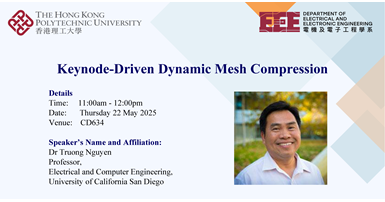Events


PolyU EEE Research Student Conference (PRSC)
17 Jul, 2025

Seminar on "Big-Tech Insights From Cutting-Edge R&D to Career Development in Tencent and Huawei" by Dr Che Haoxuan, Dr Zhou Kang and Ms Zhang Jingyun
12 Jul, 2025

Seminar on "Non-faradaic junction sensing" by Prof. WANG Yecheng
9 Jul, 2025

Seminar on "Novel Field Modulation and Magnetically Geared Machines" by Prof. Z.Q. Zhu
10 Jun, 2025
Student Sharing with the Head of Unit
9 Jun, 2025

EEE Staff Retreat
23 May, 2025

Seminar on "Keynode-Driven Dynamic Mesh Compression" by Dr Truong Nguyen
22 May, 2025
Seminar on "Multiobjective Complementary Control and Its Application to Mean-Field Games" by Dr Jiapeng Xu
9 May, 2025
Seminar on "Generating Graphs via Spectral Diffusion" by Prof. Andrea Torsello
2 May, 2025
Seminar on "Learning to Mitigate Cascading Failure Risk in Power Networks" by Miss Biwei Li
2 May, 2025




